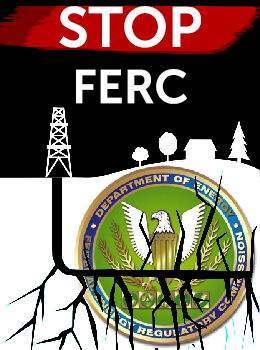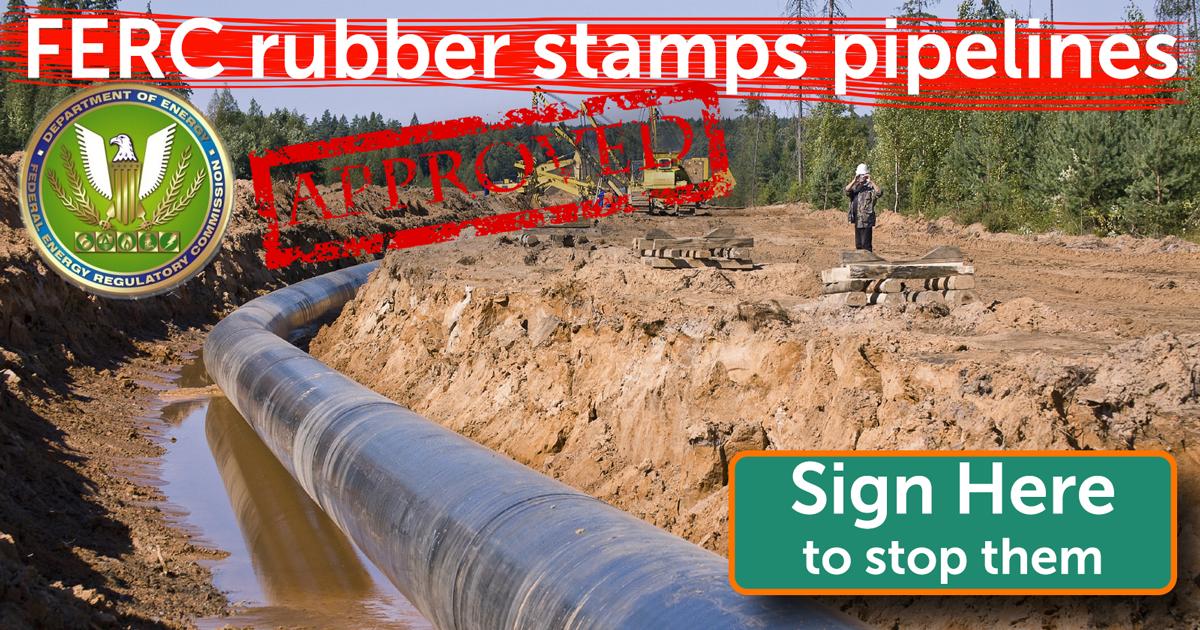After almost a year without a quorum, the Federal Energy Regulatory Commission (FERC) is back to it’s rubber-stamping ways with four new Trump appointees (three of them Republicans).
Since getting their quorum back, FERC has approved new pipelines, and considered several plans to subsidize coal, gas and nuclear over renewable energy. Thankfully, the rejected a ham-handed attempt by Secretary of (oops) Energy Rick Perry to charge ratepayers billions to subsidize the dirtiest energy in our electric grid. But, despite some groups already declaring victory, FERC’s rejection of Sec. Perry’s plan was not a repudiation of the concept.
And now, there’s a new threat: More than three months ago, FERC’s chairman said he wanted to re-examine the process by which FERC considers and (almost always) approves pipelines. Since then, FERC has been silent on how this review will work, and how the public can participate. But we got a clue to their thinking on March 15 when a three member majority — Chairman McIntyre and Commissioners Neil Chatterjee and Robert Powelson, all Republicans appointed by Trump — Signaled their intention to crack down on the number of people and groups allowed to formally intervene in pipeline applications. In fact, they specifically called out our allies at the Delaware River Keeper Network and warned them that “going forward…we will be less lenient in the grant of late interventions.” Commissioners LaFleur and Glick, both Democrats, dissented and expressed “serious concerns … particularly as it would apply to landowners and community organizations that lack sufficient resources to keep up with every docket.” But, as we warned Congress last year, their votes are not enough to matter.
Put simply, the three brand new Republicans at FERC, every one of them appointed by Trump, could be about to radically reduce public participation as part of a plan to ram through new fracked gas pipelines. Fortunately, our friends at BXE, Delaware River Keeper Network, and others are headed to FERC this week with a pre-emptive list of demands. They’ll be meeting with one of those Democratic FERC commissioners, and we hope the can hatch a plan together that will delay or disrupt this pipeline review.
 Sign here and we’ll deliver your comments in person on April 5 to one of the FERC commissioners.
Sign here and we’ll deliver your comments in person on April 5 to one of the FERC commissioners.
FERC’s pipeline review protocols were last updated in a 1999 Pipeline Policy Statement — well before the fracking boom. And while we don’t trust FERC to listen to the public or experts on climate, pollution, land rights, and other issues, the pipeline review gives us an opportunity to define what a functioning Federal Energy Regulator could look like.
With that in mind, our friends have put together a multi-point plan calling on FERC to hold no less than six public hearings in affected communities across the nation, as well as engaging in a robust and truly public comment period (not their usual sham). This week, allies will meet face to face with one of the FERC commissioners to deliver the list of demands, AND your comments. But you only have until Wednesday to sign on so we have time to deliver your name and comment! Click here to sign on to the list of demands below. Or click here to read the whole, longer letter with more footnotes and references.
Minimal reforms to the FERC process must include:
Dear FERC Commissioners
As a federal agency, the Federal Energy Regulatory Commission (FERC) has a duty to respect the law and respect the people of the United States of America. As citizens and residents who have experienced and witnessed the FERC decision making process and been impacted by its biased outcomes, we find FERC wanting in these obligations.
FERC Chairman Kevin McIntyre announced on December 21, 2017 that FERC would be reviewing both its 1999 Pipeline Policy Statement and its policies on certification of natural gas pipelines. And yet, over three months later, we have no idea how, when or even if this review is actually proceeding and to what degree, if any, the public will be given the opportunity to be involved.
Given that we are unaware of when or how the public can and should give input into this review process, we are taking the liberty of ensuring our voices are heard by volunteering our demands with regards to this review process and the reforms that must come out of it.
- It is time that FERC Implement a Pipeline Review Process that Prioritizes the Public Interest Over the Goals of the Pipeline Industry. This Means Giving Proper Priority (i.e. Highest Priority) to People, the Environment, Protection Against Climate Changing Emissions and Protection of Future Generations in Both the FERC Review and Decision-making.
- Review and Reform of FERC’s Pipeline Review Process Must Begin with a Series of No Less than Six Public Hearings Held in Affected Communities, and 90 Days for Written Comment, So FERC Can Learn How the Current Process Is Failing and the Public Interest Reforms that Are Needed.
- FERC Must Mandate a Legitimate Demonstration of “Need” for a Proposed Pipeline/Infrastructure Project that is Verified by Unbiased Experts, Is Not Comprised of Contracts to Supply Gas to the Pipeline Company Itself or Any of Its Business Counterparts, and Is Not/Cannot be Supplied by Renewable or Existing Energy Sources.
- There Must Be a Prohibition on FERC Issuing (a) Certificates of Public Convenience or Necessity, (b) Notices to Proceed with Any Aspect of Construction, Including Tree Felling, and/or (c) Approval for Exercise of Eminent Domain, Until Such Time as an Infrastructure Project Has Secured All State, Federal and/or Regional Permits, Dockets and/or Approvals. This Includes a Prohibition on Conditional FERC Certificates.
- FERC Must End Its Strategic Practice of Failing to Affirmatively Grant or Deny Rehearing Requests, But Instead Issue Responses that Provide FERC More Time for Consideration (i.e. a Tolling Order), and as a Result Prevent Pipeline Challengers from Bringing a Legal Challenge in the Courts while FERC Grants the Pipeline Company the Power of Eminent Domain and Approval for Construction.
- FERC Must Prohibit the Practice of Hiring Third-Party Consultants to Assist in the FERC Review Process who Have Any Business Contracts (Past, Present or Future) with a Pipeline Company Seeking FERC Approval, and Must Prohibit FERC Commissioners or FERC Staff from Working on or Deciding upon Any Pipeline or Infrastructure Project in which They or a Family Member Have a Direct or Indirect Financial or Employment Interest.
- FERC Must End the Practice of Using Segmentation, Allowing Pipeline Companies to Break Up Projects into Smaller Segments in Order to Undermine a Full and Accurate Review of Community and Environmental Impacts.
- FERC Must Commit to a Full and Fair Implementation of the National Environmental Policy Act, Including Full and Fair Evaluation of Climate Change Impacts; Induced Fracking/Drilling Operations; Costs of Construction, Operation and Maintenance (not Just Benefits); Health and Safety Impacts; the Full Array of Community, Business and Environmental Impacts that Will Result; and that All Inaccurate, Missing, False or Misleading Data and/or Information Identified by FERC and/or Public Commenters Are Fully, Completely and Accurately Addressed.
- FERC Must End the Practice of Allowing Pipeline Companies to Secure a 14% Rate of Return on Equity on All New Pipeline Projects In Order to Ensure the Public Does Not Bear the Burden of Flawed Projects and to Ensure that FERC Does not Incentivize Inappropriate and/or Unwarranted Pipeline/Infrastructure Construction.
In conclusion, if FERC is serious about wanting a full, fair, and properly informed decision-making process for fracked gas pipelines, compressors, LNG export, storage and related infrastructure projects, it will commit to the process and substantive asks laid out in this letter.
Together, we can take action to disrupt or delay FERC’s pipeline review process. And if we succeed, we can create some space for communities on the frontlines fighting frackged gas pipelines to demand changes and a stop to construction. But only if we act fast, and together with our allies.
Sign here and we’ll deliver your comments in person on April 5 to one of the FERC commissioners. We’ll also keep you updated about our plans for a massive mobilization at FERC later this spring, and more ways you can get involved and support us!
PS – got a pipeline fighting group or local organization that wants to endorse the letter? You can sign on as an organization (instead of an individual) here.
Gas Pipeline image from National Parks Conservation Association

Pipeline Review process is an important and necessary step